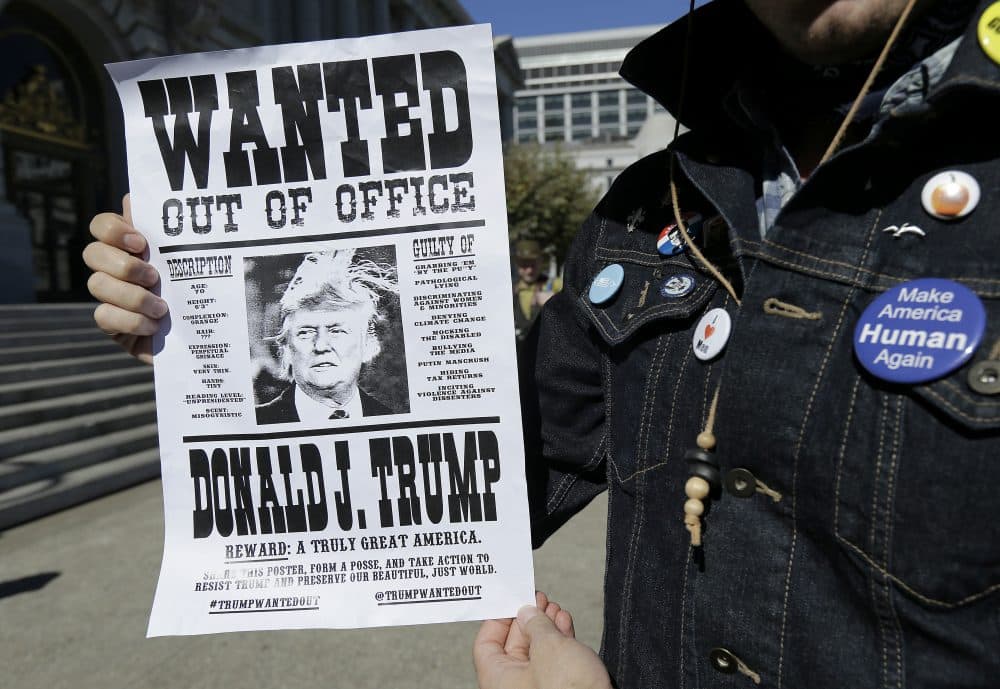Advertisement
Commentary
Impeachment Talk Is Heating Up. But Is It Time?

President Trump is a compulsive liar who scorns the rule of law. To poach a line from Norm Macdonald's heyday on "Saturday Night Live," the country is split between those who agree with that statement and those who are really, really stupid.
What even some smart people don’t know is that the statement’s truth is, arguably, grounds to impeach Trump, even without his having committed a crime.
That’s right: Even if he didn’t collude with the Russians during the election, or cover up underlings’ collusion, or isn’t violating the Constitution’s emoluments clause for his businesses’ foreign earnings, Trump may meet the Founders’ standard for getting the boot.
For non-lawyers, that’s the big takeaway from “Impeachment: A Citizen’s Guide,” a new book by Harvard Law professor Cass Sunstein. The slim manual is a tour of the history behind the spare words the Constitution offers for when to remove high officials: ”treason, bribery, or other high crimes and misdemeanors.”
Sunstein disavows what he calls the “fundamentally wrong” belief, uttered by many liberals (even House Democratic Leader Nancy Pelosi), that a president must break a law to be impeached.
The book doesn’t address Trump directly, though Sunstein told journalist David Leonhardt that he wrote it after what he considered jumping-the-gun chatter about removing Trump earlier this year. For all the Constitution’s brevity on the topic, he writes, the Founding Fathers had plenty of English case law to guide them, and they wrote and spoke a lot about impeachment.
Start with England. “As practice unfolded, ‘high Crimes and Misdemeanors’ could mean serious crimes, but it could also mean serious offenses that were not in technical violation of criminal law,” Sunstein writes. Among them: “procuring offices for people who were unfit and unworthy of them.”

(From a hilariously unqualified judicial nominee to the string of appointees who’ve resigned for missteps or law-breaking, Trump’s henchmen have been billboards on legs for “unfit and unworthy.”)
The Founders, at the 1787 Constitutional Convention and in the follow-up Federalist Papers defending its work, augmented English practice by allowing impeachment when officials affronted the republican principles the new nation had gone to war to establish. Sunstein summarizes the thinking:
"Impeachment is available for egregious abuses of official authority. Some crimes do not count as such, because they are essentially private (failing to pay taxes, punching someone, speeding) or because they are not sufficiently serious. Some offenses that are not crimes are nonetheless impeachable—punishing political enemies, trampling on liberty, deciding to take a year off, systematically lying to Congress and the American people. Such actions count as ‘high misdemeanors.’"
Systematic lying? The list of Trump’s whoppers, from slurring his predecessor with racist birther-ism to falsely claiming last year’s election was corrupted by millions of illegal voters (but not by Russian meddling, because his good buddy Vlad denies that), sags with untruths directly related to public, not private, affairs.
As for respecting republican values, the president’s authoritarian-leaning predations include waging verbal war to undermine vital institutions he leads, such as the FBI and Justice Department, and retaining a lawyer who believes the chief executive “cannot obstruct justice.”
Sunstein tosses one bone to Trump supporters. The Founders intended the civic trauma of impeachment as a rare, last resort, and the country has heeded them. The book lists the 15 worst presidents, as chosen in a recent poll of historians — a list Trump, at his current rate, is a shoo-in to make someday. Yet only one was impeached, while a second survived serious talk of impeachment.
Overall, only two of our 45 presidents have been impeached; a third, Richard Nixon, resigned to avoid all-but-certain impeachment. For the Founders, incompetence had to endanger the state to merit removal from office. “Bad decisions, or politically objectionable decisions, are not sufficient grounds for impeachment,” writes Sunstein, “even if much of the nation is up in arms. The United States, unlike some other democracies, does not allow votes of no confidence.”
I agree with those who say pursuing impeachment is screaming into the political wind for now, as the Republican see-no-evils running Congress won’t take down a Republican president. But if the GOP loses its legislative majority in the 2018 midterm elections, we deserve a serious national conversation about whether Trump is fit for his job.
Until then, if you’re still speaking to your Trump-worshiping Uncle Ted and want him to spit out his Christmas cookie in rage during the holiday feast, Sunstein will give you some ammo.
